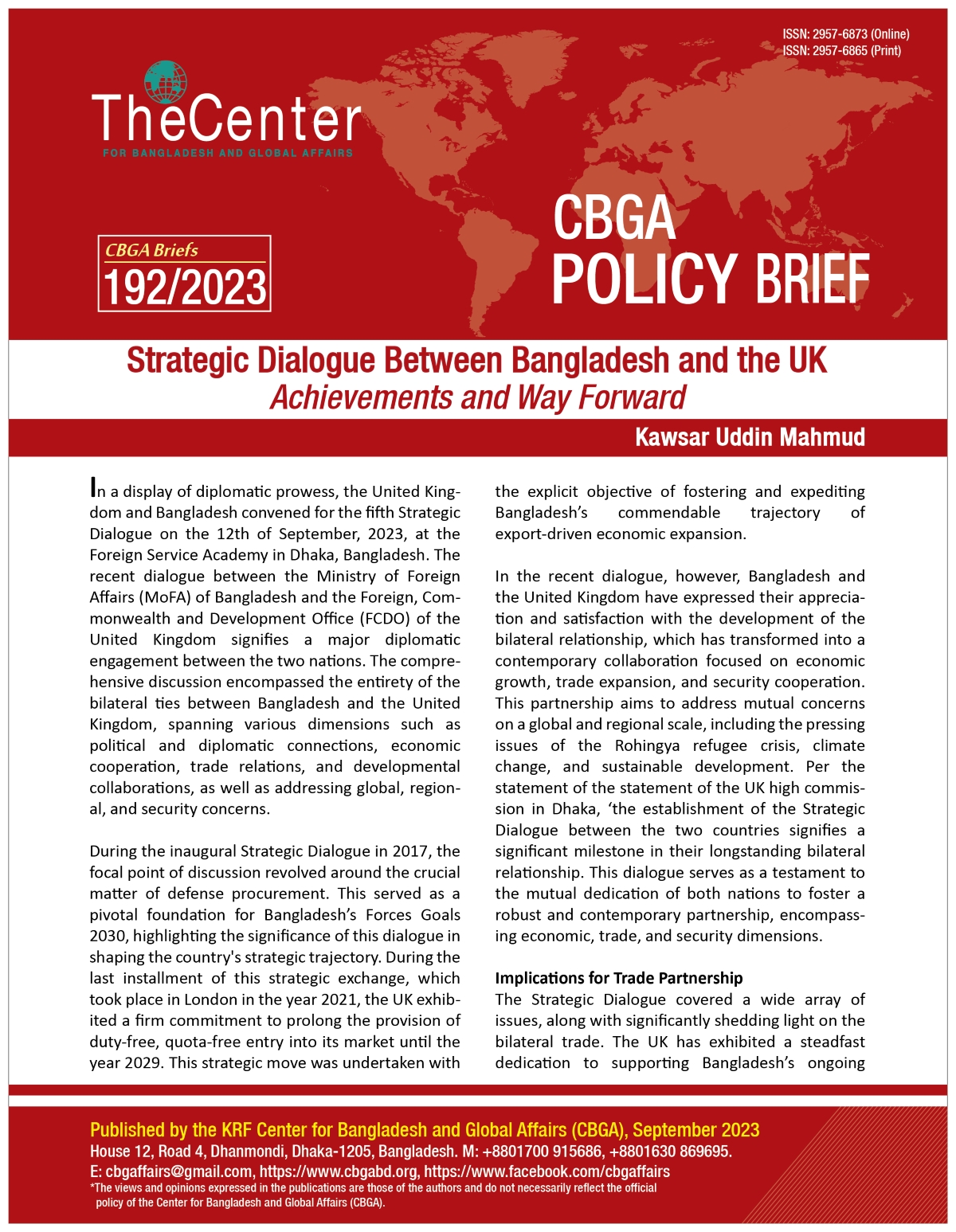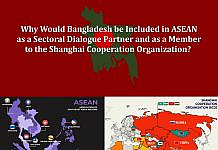
In a display of diplomatic prowess, the United Kingdom and Bangladesh convened for the fifth Strategic Dialogue on the 12th of September, 2023, at the Foreign Service Academy in Dhaka, Bangladesh. The recent dialogue between the Ministry of Foreign Affairs (MoFA) of Bangladesh and the Foreign, Commonwealth and Development Office (FCDO) of the United Kingdom signifies a major diplomatic engagement between the two nations. The comprehensive discussion encompassed the entirety of the bilateral ties between Bangladesh and the United Kingdom, spanning various dimensions such as political and diplomatic connections, economic cooperation, trade relations, and developmental collaborations, as well as addressing global, regional, and security concerns.
During the inaugural Strategic Dialogue in 2017, the focal point of discussion revolved around the crucial matter of defense procurement. This served as a pivotal foundation for Bangladesh’s Forces Goals 2030, highlighting the significance of this dialogue in shaping the country’s strategic trajectory. During the last installment of this strategic exchange, which took place in London in the year 2021, the UK exhibited a firm commitment to prolong the provision of duty-free, quota-free entry into its market until the year 2029. This strategic move was undertaken with the explicit objective of fostering and expediting Bangladesh’s commendable trajectory of export-driven economic expansion.
In the recent dialogue, however, Bangladesh and the United Kingdom have expressed their appreciation and satisfaction with the development of the bilateral relationship, which has transformed into a contemporary collaboration focused on economic growth, trade expansion, and security cooperation. This partnership aims to address mutual concerns on a global and regional scale, including the pressing issues of the Rohingya refugee crisis, climate change, and sustainable development. Per the statement of the statement of the UK high commission in Dhaka, ‘the establishment of the Strategic Dialogue between the two countries signifies a significant milestone in their longstanding bilateral relationship. This dialogue serves as a testament to the mutual dedication of both nations to foster a robust and contemporary partnership, encompassing economic, trade, and security dimensions.
Implications for Trade Partnership
The Strategic Dialogue covered a wide array of issues, along with significantly shedding light on the bilateral trade. The UK has exhibited a steadfast dedication to supporting Bangladesh’s ongoing economic progress through substantive policy initiatives and establishing bilateral frameworks designed to enhance trade and investment. With a 25.0% (or £902 million at current prices) growth from 2022, Bangladesh and the UK have been experiencing a volume of £4.5bn total trade in goods and services in the four quarters ending in Q1 2023. The UK, as ‘the second-biggest cumulative investor’ in Bangladesh, holds a significant interest in the economic well-being of the nation. This statement was confirmed at the second round of the Bangladesh-UK Trade and Investment Dialogue that took place earlier this year. The dialogue positively contributed to exploring ways to enhance economic connections, secure market entry, and overcome barriers to increased trade and investment.
In the dialogue, moreover, the UK especially applauded Bangladesh’s landmark Aviation Trade and Investment Partnership’s signature in May of 2023. With the help of this agreement, people, products, and services may more easily move between the two nations by air. The expansion of aviation has the potential to open up hitherto unrealized markets for travel, commerce, and investment. In addition, the UK confirmed its intention to provide Bangladeshi exporters preferential treatment through the Developing Countries Trading Scheme. In this respect, accessing the UK market without paying duties or quotas has been a game-changer for Bangladesh’s export-driven economic plan. The UK recognized the Scheme’s significance in connecting Bangladesh to the international economy and opening new channels for trade. In addition, Bangladesh welcomed the UK’s willingness to share its technical expertise in areas crucial for elevating Bangladesh’s position in global value chains, including automotive, pharmaceuticals, transport, and climate-smart infrastructure. Overall, both countries have demonstrated a shared vision for propelling two-way trade and investment flows to new heights through the dialogue.
Migration and Returns
Bangladesh and the United Kingdom have agreed to establish a Joint Working Group on migration and return to increase collaboration on migration and justice problems. Standard operating procedures for the returns process between the two countries will be the primary focus of this working group. Both nations recognize the need to establish fair and humanitarian procedures for the return and readmission of illegal migrants, and this decision reflects that priority. The committee will outline quick, courteous, and transparent methods for confirming citizenship in Bangladesh. There is a lot riding on the working group’s ability to meet its October deadline for holding its first meeting and finalizing ‘Standard Operating Procedures’ for returns paperwork and timeframes. This exemplifies the significance both governments have on establishing a cooperative stance on migration. Once approved, the processes will provide greater consistency and order to the returns process.
Underscoring Rohingya Refugee Crisis
The Rohingya refugee crisis, with over 1 million displaced Rohingya sheltered in Bangladesh, formed a pivotal agenda item during the strategic dialogue. The UK highly praised Bangladesh for its immense humanitarian gesture in continuing to host this vulnerable population despite the significant burden imposed, especially on host communities adjoining the refugee camps. However, both countries concurred that the current situation of indefinite encampment cannot endure permanently. The UK stressed that for repatriation to be viable, concrete steps must be undertaken to improve livelihood opportunities and freedom of movement for Rohingya in Rakhine State, Myanmar. Enhancing access to education, healthcare, and sustainable income sources will be vital preparatory measures before the commencement of safe, voluntary, and dignified repatriation. The UK announced an additional £3 million funding directed at the refugee response, underscoring its stance as a leading donor. This brings the UK’s total contribution to £368 million since the crisis erupted in 2017.
Bangladesh welcomed the UK’s enduring engagement on the humanitarian and political fronts. It outlined priorities identified during its recent interactions with Myanmar, including pursuing a bilateral repatriation agreement, boosting security in Rakhine through joint patrols, and implementing quick-impact projects to build trust. Bangladesh also highlighted that building climate-resilient shelters in designated areas must precede any returns. Both countries reiterated their commitment to supporting the voluntary return of Rohingya to their homes in Rakhine State once conditions on the ground demonstrate tangibly improved rights and freedoms. The UK and Bangladesh, moreover, concurred on advocating for greater UN access to Rakhine to conduct comprehensive needs assessments.
Indo-Pacific Strategy Convergence and Other Issues
Along with discussing the importance of upholding democratic norms in Bangladesh by encouraging free, fair, and democratic elections and noting the Russian-Ukraine war and its consequences in the world food supply and economic value chain, the UK accentuated its growing engagement with the region, as exemplified through pursuing Comprehensive and Progressive Agreement for Trans-Pacific Partnership membership and securing ASEAN Dialogue Partner status. These concrete steps demonstrate the UK’s commitment to deepening economic and security ties with Indo-Pacific nations after Brexit.
However, as for Bangladesh’s part, it highlighted the country’s recent articulation of the Indo-Pacific Outlook, which outlines areas, where Bangladesh is expanding cooperation with regional actors, such as maritime security, blue economy, regional connectivity, disaster resilience, and upholding international rules and norms. Both countries recognize the Indo-Pacific as a region of expanding economic opportunities but also emerging challenges. They concur that upholding the rules-based international order, freedom of navigation and peaceful resolution of disputes will be critical for regional stability. As “Global Britain” seeks to enhance its footprint in the region, closer collaboration with key regional actors like Bangladesh can bolster its engagement.
The Way Forward
The fifth Bangladesh-UK Strategic Dialogue has laid a sound basis for expanding cooperation between the two countries. Both nations have a long history together and have similar goals for increasing trade, combating climate change, controlling immigration, and preserving international order. Nonetheless, to take things further, there is a need to work together on certain key priorities. In terms of trade and investment, there has to be an attempt to broaden the economic collaboration beyond the ready-made garments industry. While the United Kingdom has shown support for Bangladeshi exports, growth prospects lie in areas like pharmaceuticals, telecom, infrastructure, and automotive. The UK could share technical know-how to help Bangladesh move up the value chain and enter new export sectors. Bangladeshi commodities should have more duty-free access via schemes like the Developing Countries Trading Scheme.
On climate change, the UK is one of the top countries in supporting Bangladesh’s adaptation efforts. There is room for improvement, however, in the ways in which public policy encourages private sector investment in climate-resilient energy generation, waste disposal, and management. Furthermore, in the facets like migration governance, regional security, defense cooperation and the repatriation of the Rohingya displaced people, the UK can come up with a strong partner of Bangladesh elevating the bilateral rapport to a new height by bolstering substantial engagement and continuing such bilateral strategic dialogue. As during the dialogue, FCDO Permanent Under-Secretary Sir Philip Barton put it, “The Dialogue is a reflection of the growing relationship between our two countries, and our desire to work together more closely on our economic, trade, and development partnerships and on regional and global security issues.”
– Kawsar Uddin Mahmud is a Research Intern at the KRF Center for Bangladesh and Global Affairs (CBGA).







